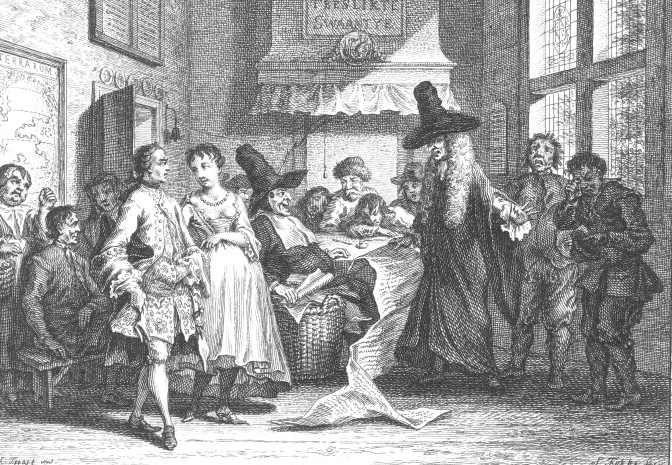Meerderjarig means ‘of age,’ having reached the age of majority. What the age of majority was, depends on the time and place. Youngsters could also be declared to be of age by the court, usually with consent of the parents or guardians.
Age of majority in the Netherlands
| Period | Age of majority |
|---|---|
| Before 1811 | Depends on the region, usually 25. |
| 1811-1838 | 21 |
| 1838-1901 | 23 |
| 1901-1988 | 21 |
| Since 1988 | 18 |

Couple appearing in court. Credits: Simon Fokke, collection Rijksmuseum (Public Domain)
- Pieter Nieuwland, Friezen Gezocht (Leeuwarden: Tresoar, 2005), 101.


I think you meant to write ‘maturity’?
As far as I know, ‘of age’ and ‘majority’ are the terms typically used in English law for being legally old enough to do something. Those are the terms I come across in genealogical literature anyway. As I see it, maturity is more about a state of mind rather than a legal status. You can be meerderjarig without being mature (and vice versa).
Perhaps a native speaker can jump in to help out?
Yvette, your usage is 100% correct. “Maturity” is not a synonym for “majority” is any context that I can think of. It refers specifically to reaching the age where you gain full legal control of your own affairs, as opposed to your minority when, as a child, you lacked such control. A person can be of majority and yet be immature, or be mature and yet not have reached the age of majority – or neither or both, and you get the idea. 🙂
You are correct Yvette, the term is “age of majority”. A person who has not reached this age is called a “minor”. However, strangely, a person who has reached age of majority is not called a “major”. 🙂 This age can vary by state and purpose.
Just to put a button on it, “age of majority” is also the term used in Commonwealth countries (e.g. Canada, Australia, New Zealand, UK, etc.).